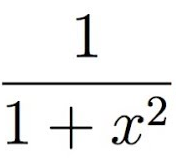PythonのJITがすごい
linux + python + opencvでロゴ検出類似度であれこれしようとしてるときに
pythonのNumbaのjitがすごい!みたいな記事を見かけたので試してみました。
とりあえず試してみる
プログラミングは専門外なので詳しくないですが
from numba import jit ,njit |
from numba import prange |
@jit() |
def function4(): |
hoge |
return |
defの前に@jitをつけるだけ。
結果(N=10**8)
| エントリー | 時間 |
|---|---|
| C | 2.45秒 |
| func1 | 28.00秒 |
| func2(1+jit) | 3.09秒 |
| func3 | 32.8秒 |
| func4(3+jit) | 1.41秒 |
| func5(3+jit+prange) | 0.66秒 |
| func6(numpy) | 2.67秒 |
@jitつけるだけでお手軽で速すぎなのでは。
pythonのループは遅い(とくにfor)ってきいてたけどデフォは確かに遅かった。
numpyはよく分かってないのでこれでいいのかは不明。
間違いがあれば教えてください。
使ったもの1
#include <stdio.h> |
#include <stdlib.h> |
#include <time.h> |
#include <math.h> |
int main(void){ |
long int i; |
long int count = 0; |
long int max = pow(10,8); |
double x,y,pi; |
clock_t start,end; |
srand(time(NULL)); |
start = clock(); |
|
for(i=0;i<max;i++){ |
x = (double)rand()/RAND_MAX; |
y = (double)rand()/RAND_MAX; |
if(y<1/(1+x*x)) |
count++; |
} |
pi = (double)count / max * 4; |
end = clock(); |
printf("%f\n", pi); |
printf("%.2f秒かかりました\n",(double)(end-start)/CLOCKS_PER_SEC); |
return 0; |
} |
使ったもの2
#!/usr/bin/python3 |
# -*- coding: utf-8 -*- |
import time |
import random |
import numpy as np |
from numba import jit ,njit |
from numba import prange |
N=10**8 |
def function1(): |
A=[1 if 1/(1+(random.random())**2) > random.random() else 0 for i in range(N) ] |
ans=4*A.count(1)/N |
return |
@jit |
def function2(): |
A=[1 if 1/(1+(random.random())**2) > random.random() else 0 for i in range(N) ] |
ans=4*A.count(1)/N |
return |
def g(x): |
return 1.0/(1.0+x**2) |
def function3(): |
count = 0 |
for i in range(N): |
x ,y= random.random(),random.random() |
if y < g (x): |
count +=1 |
ans=4*count/N |
print(ans) |
return |
@jit('f8(f8)') |
def f(x): |
return 1.0/(1.0+x**2) |
@jit() |
def function4(): |
count = 0 |
for i in range(N): |
x ,y= random.random(),random.random() |
if y < f(x): |
count +=1 |
ans=4*count/N |
print(ans) |
return |
@jit(nopython=True, parallel=True) |
def function5(): |
count = 0 |
for i in prange(N): |
x ,y= random.random(),random.random() |
if y < f(x): |
count +=1 |
ans=4*count/N |
print(ans) |
return |
def function6(): |
x, y = np.random.rand(N), np.random.rand(N) |
c = (y<1.0/(1.0+x**2) ).sum() |
ans=4*c/N |
print(ans) |
return |








